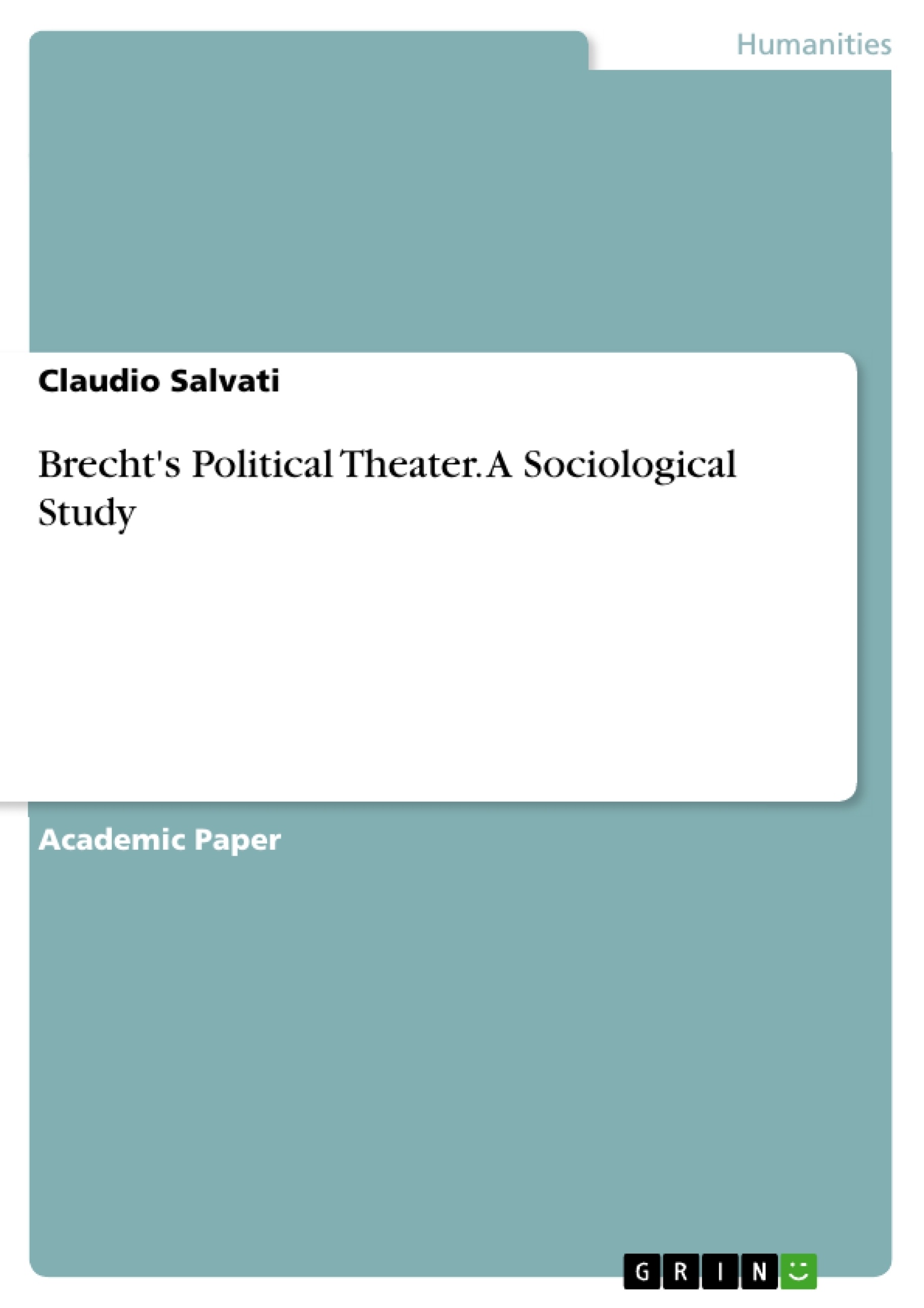Bertolt Brecht, dramaturge, director, lyricist, and essayist, represents one of the most important personalities of 20th century European culture; not only because of his creative activity and talent, but also because of his moral ambition and intellectual power, which are reflected in his countless works.
He belongs to a generation shaped by the First World War and the subsequent period of poverty and unrest and experiences the end of the German Empire and Hitler's election as Reich Chancellor at close quarters. He then leaves Germany and in exile, nolens volens, he can devote himself to his greatest passion, the theater. But his theater does not explicitly deal with individual historical events; rather, it addresses the social conditions of a (capitalist) society in which "unbridled violence, oppression, and exploitation" (cf. Brecht 1697b: 479) prevail, which restrict and "corrupt" the working class, but also the theater (ibid.: 231). However, Brecht's view is not a pessimistic one: he also sees the potential in humanity (cf. ibid.: 668-669) and decides to create a new form of theater; one that does justice to the "scientific age" (cf. Brecht 1967c: 662) and has the power to change society.
Inhaltsverzeichnis (Table of Contents)
- Introduction
- Brecht's political theater
- Criticism of Aristotle's Poetics
- Criticism of contemporary theater
- The epic theater
- The teaching pieces
- Relationship to Marxism
- Relationship to sociology
Zielsetzung und Themenschwerpunkte (Objectives and Key Themes)
This sociological study aims to analyze Bertolt Brecht's political theater, exploring his critical perspective on traditional theatrical forms and his development of epic theater as a tool for social change.
- Brecht's critique of Aristotelian and contemporary theater
- The concept of epic theater and its principles
- The role of the alienation effect and its application in Brecht's plays
- The pedagogical function of theater and the concept of the teaching play
- Brecht's engagement with Marxist thought and its influence on his theatrical practice
Zusammenfassung der Kapitel (Chapter Summaries)
- Introduction: Introduces Bertolt Brecht as a significant figure in 20th-century European culture and explores his artistic and intellectual motivations in the context of his historical background.
- Brecht's Political Theater: Explores Brecht's critique of traditional theater, focusing on his rejection of Aristotelian principles and his critique of contemporary theater's conformity to the ruling class.
- Criticism of Aristotle's Poetics: Examines Brecht's analysis of Aristotelian drama and his rejection of catharsis as a means of achieving social change. Brecht aims for a critical and engaged audience.
- Criticism of Contemporary Theater: Outlines Brecht's view of contemporary theater as a tool for social control, promoting apathy and reinforcing the status quo.
- The Epic Theater: Presents Brecht's development of epic theater as a counterpoint to traditional theater. It emphasizes rationality over emotion and aims to promote a critical and analytical approach to the audience.
- The Teaching Pieces: Discusses Brecht's concept of the didactic play, aiming to educate and inspire through the reproduction of socially positive actions and attitudes.
- Relationship to Marxism: Examines Brecht's engagement with Marxist thought and his adoption of Hegel's and Marx's dialectical methods in his plays and writings.
Schlüsselwörter (Keywords)
Brecht's political theater, epic theater, alienation effect, didactic play, Marxism, social critique, catharsis, contemporary theater, Aristotelian theater, Lehrstück, teaching play, dialectics.
Frequently Asked Questions
What is Bertolt Brecht's "Epic Theater"?
Epic theater is a form of political drama that aims to provoke rational thought and social change rather than just emotional empathy.
What is the "Verfremdungseffekt" (alienation effect)?
It is a technique used to make familiar things seem strange, preventing the audience from becoming passively absorbed in the story and encouraging critical analysis.
Why did Brecht criticize Aristotelian theater?
Brecht rejected the idea of "catharsis" (emotional cleansing), arguing that it makes the audience passive and accepting of the status quo instead of wanting to change society.
What are Brecht's "Lehrstücke" (teaching plays)?
These are radical, experimental plays designed to educate the performers and audience about social and political issues through participation and observation.
How did Marxism influence Brecht's work?
Marxism provided Brecht with a dialectical method to analyze class struggle and capitalist exploitation, which became the central themes of his plays.
- Quote paper
- Claudio Salvati (Author), 2014, Brecht's Political Theater. A Sociological Study, Munich, GRIN Verlag, https://www.grin.com/document/1271026



